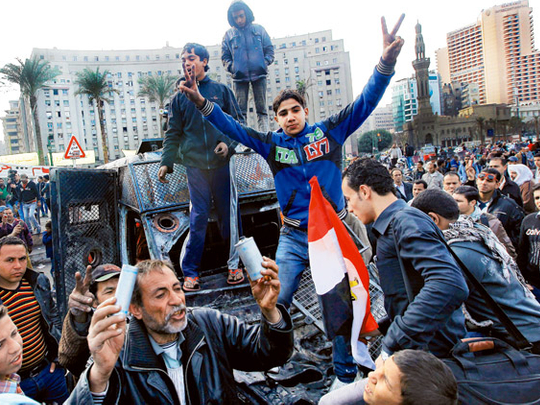
Cairo: Egyptian Defence Minister General Abdel Fattah Al Sissi warned on Tuesday that the political crisis rocking Egypt could lead to the collapse of the state. Failure to resolve the situation “could lead to grave repercussions if the political forces do not act” to tackle it, Sissi said in comments posted on his Facebook page.
“The continuing conflict between political forces and their differences concerning the management of the country could lead to a collapse of the state and threaten future generations,” Sissi said in the comments, which were extracts of a speech he gave to students at a military academy. Sissi, who is also the head of Egypt’s military, further warned that the political, economical, social and security problems facing Egypt constitute “a threat to the country’s security and stability”.
Sissi stressed that “the attempts to undermine the stability of state institutions is a dangerous thing that harms national security and the future of the country,” but said “the army will remain strong... as a pillar of the state’s foundations.”
Fifty-two people have died in five days of violence that erupted Thursday night, as the country marked the second anniversary of the start of the uprising that toppled Hosni Mubarak.
“Egyptians are really alarmed by what is going on,” said Cairo-based analyst Elijah Zarwan, adding that the army was reflecting the broader concern among the wider public. “But I don’t think it should be taken as a sign that the military is on the verge of stepping in and taking back the reins of government,”
he said.
Sisi was picked by Mursi after the army handed over power to the new president in June once Mursi had sacked Field Marshal Hussain Tantawi, in charge of Egypt during the transition and who had also been Mubarak's defence minister for 20 years.
The instability has provoked unease in Western capitals, where officials worry about the direction of a powerful regional player that has a peace deal with Israel. The United States condemned the bloodshed and called on Egyptian leaders to make clear violence was not acceptable.
DEEPLY POLARISED
The 58-year-old previously headed military intelligence and studied at the US Army War College. Diplomats say he is well known to the United States, which donates $1.3 billion in military aid each year, helping reassure Washington that the last year's changes in the top brass would not upset ties.
One of Sisi's closest and longest serving associates, General Mohammad Al Assar, an assistant defence minister, is now in charge of the military's relations with the United States.
Almost seven months after Mursi took office, Egyptian politics have become even more deeply polarised.
Opponents spurned a call by Mursi for talks on Monday to try to end the violence. Instead, protesters have rallied in Cairo and Alexandria, and in the three Suez Canal cities - Port Said, Esmailiya and Suez - where Mursi imposed emergency rule.
On Tuesday, thousands were again on the streets of Port Said to mourn the deaths of two people in the latest clashes there, taking the total toll in Mediterranean port alone to 42 people. Most were killed by gunshots in a city where weapons are rife.
In Cairo on Tuesday afternoon, police again fired teargas at stone-throwing youths in a street near Tahrir Square, the centre of the 2011 uprising. But the clashes were less intense than previous days and traffic was able to cross the area. Street cleaners swept up the remains of burnt tyres and other debris.
The police have been facing "unprecedented attacks accompanied by the appearance of groups that pursue violence and whose members possess different types of weapons", the state news agency reported, quoting the Interior Ministry spokesman.
Street flare-ups are a common occurrence in divided Egypt, frustrating many people desperate for order and economic growth.
WARY MILITARY
Although the general's comments were notably blunt, Egypt's military has voiced similar concerns in the past, pledging to protect the nation. But it has refused to be drawn back into a direct political role after its reputation as a neutral party took a pounding during the 17 months after Mubarak fell.












